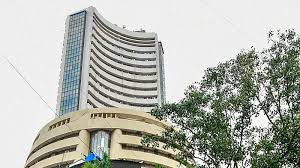Markets open in red: Sensex, Nifty tank 0.8% amid escalating Israel-Iran tensions

Mumbai, June 23, 2025 – Indian stock markets opened lower on Monday. Both the Sensex and Nifty fell by nearly 0.8%, reacting to escalating tensions between Israel and Iran. The decline followed U.S. airstrikes on Iranian nuclear sites, which raised global fears of a broader conflict.
📊 Sensex, Nifty Slide as Global Risks Grow
The Sensex dropped over 700 points, trading near 81,700, while the Nifty slipped below 24,900, falling more than 180 points. These early losses mirror global uncertainty. Investors reacted sharply to military strikes on Iranian sites, worrying that the conflict could worsen.
Traders fear that oil supply routes might get disrupted, especially through the Strait of Hormuz, a vital energy corridor. Iran has threatened to block it in the past, raising concerns across global markets.
🛢️ Crude Oil Prices Surge; India Feels the Heat
Crude oil jumped sharply, with Brent crossing $91 per barrel, hitting a five-month high. India, which imports most of its oil, faces a major challenge if prices stay elevated. Rising fuel costs can lead to higher inflation and increase the trade deficit.
Analysts worry that the Reserve Bank of India (RBI) may delay rate cuts. If inflation rises again, it will complicate monetary policy decisions.
📉 IT, Auto, and Banks Lead the Fall
The sell-off hit most sectors. IT stocks saw the steepest decline. The Nifty IT Index fell around 1.8%, weighed down by weak global demand and lower outsourcing orders. Major tech firms like TCS, Infosys, and Wipro lost ground.
Auto and financial stocks also came under pressure. High crude prices usually affect auto manufacturers by pushing input costs higher. Banks, meanwhile, saw selling as investors grew risk-averse.
Some defensive stocks like Bharti Airtel and Bharat Electronics managed minor gains. These stocks often hold steady during times of uncertainty.
⚠️ Foreign Investors Turn Cautious, Volatility Rises
The India VIX, which measures market fear, jumped over 5%. This spike signals rising nervousness among traders. Foreign Institutional Investors (FIIs), who had been buying Indian stocks last week, appeared to pull out early today. Domestic Institutional Investors (DIIs) bought selectively but couldn’t stop the decline.
💬 Analysts Advise Caution, Not Panic
Despite the dip, many analysts see this as a temporary correction. UBS believes that unless oil supply is severely disrupted, markets will recover. They suggest using this dip to invest in strong, undervalued companies.
Market strategist Aamar Deo Shridhar advises focusing on defense, utilities, and capital goods. These sectors may benefit from government spending and are less vulnerable to global shocks.
📈 Rising Oil Could Delay Rate Cuts
Oil prices will be crucial in the coming weeks. If they stay high, India’s consumer inflation may rise again. This could push the RBI to delay rate cuts expected later this year. A wider current account deficit is another risk if import costs surge.
Economists say that while India’s economy remains strong, global uncertainty could still affect short-term market moves.
🔍 What to Watch This Week
Key factors to track include:
- Updates from the Middle East conflict
- Global crude oil prices
- Movement in U.S. and Asian equity markets
- India’s domestic data, including GDP and inflation reports
Volatility may continue in the short term. Traders should avoid large bets and consider safer options like gold or high-quality debt funds.
✅ Final Take: Stay Calm, Stay Informed
Indian markets opened in red as global fears rattled investors. Tensions between Israel and Iran, combined with a sharp oil spike, dragged down both Sensex and Nifty. While risks remain, analysts suggest avoiding panic.
The fundamentals of the Indian economy remain solid. Investors who stay informed and choose wisely may find good opportunities, even during this volatile phase.






